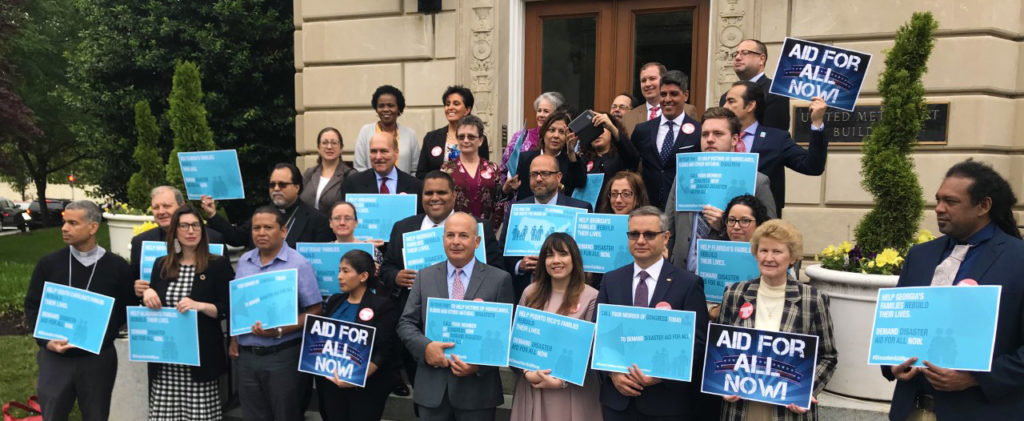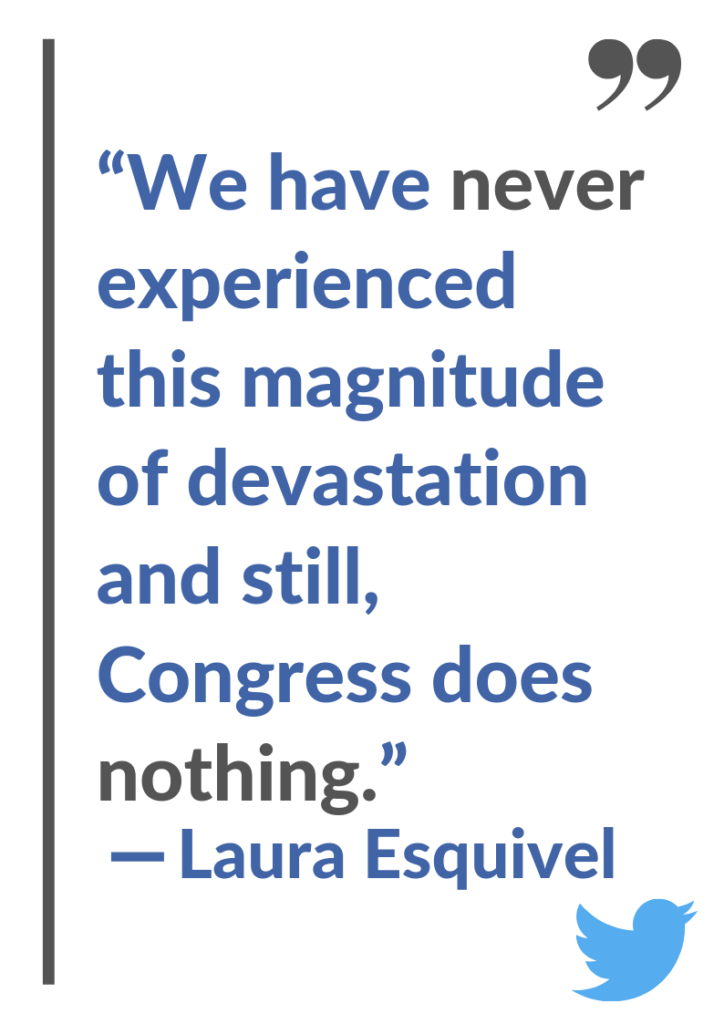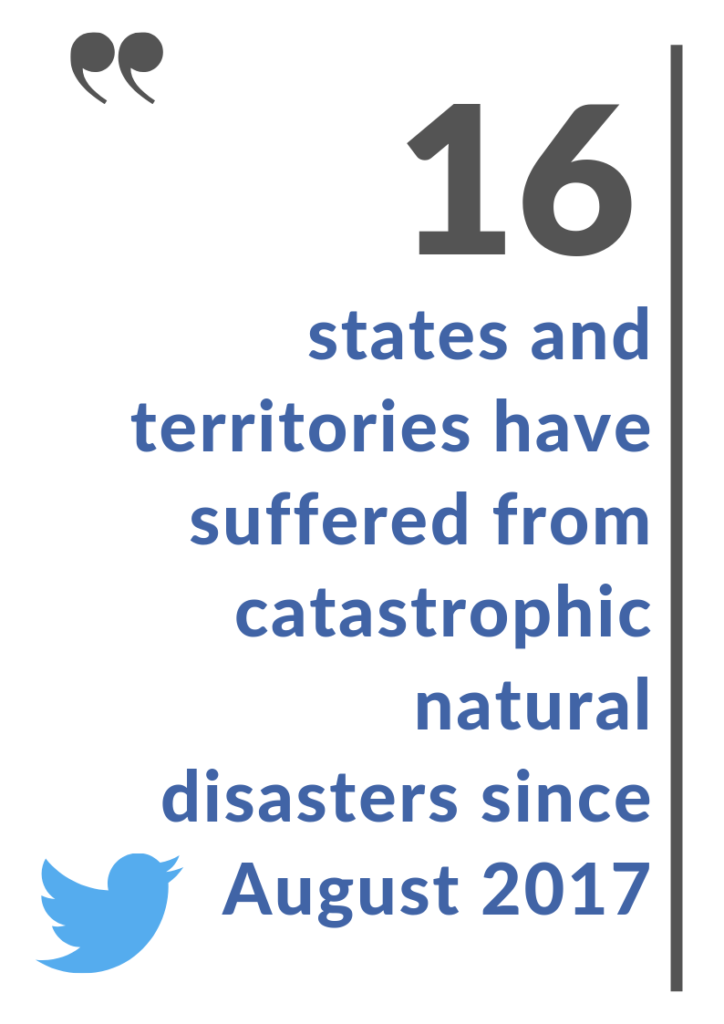
Amid devastating disasters, advocates demand aid for states and territories

Advocates gathering for the press event before their meetings in Senate offices on May 1, 2019.
Advocates for disaster aid barnstormed senators’ offices Wednesday as a coalition pressed for funding to address what arguably has been the most costly and devastating series of natural disasters to hit both states and territories in the U.S. in modern history.
It seems as though the disasters won’t stop. Farmers and agricultural communities across the U.S. currently are struggling with the latest round of flooding, which threatens their ability to plant crops this spring, and as recently as March, four people died as a result of a freak blizzard and subsequent flooding on a South Dakota Native American reservation – Pine Ridge, one of the poorest areas in America.
Wednesday marked the first day of a National Week of Action for groups demanding aid for devastated areas. The groups kicked off their activities with a news conference on Capitol Hill. Laura Esquivel, Director of National Advocacy for the Hispanic Federation, discussed how frustrated advocates are by the continued delays in Congress, which has been grappling with disaster aid legislation since January, but has failed to take action.
“Every time we think we’re close to getting something passed, it stalls, they go home, they go on break,”  she said. “We have never experienced this magnitude of devastation and still, Congress does nothing.”
she said. “We have never experienced this magnitude of devastation and still, Congress does nothing.”
In addition to the Hispanic Federation, the groups participating in Wednesday’s events included Feeding America, the American Farm Bureau Federation, Corporacion ENLACE del Cano Martin Pena, CHN, Jubilee USA, NETWORK, Oxfam America, the Sierra Club, and the Coalition for Food Security – Puerto Rico. (You can read CHN’s statement here.)
And they included individuals and institutions affected first-hand by the series of natural disasters.
Alexis Underwood is a middle-school teacher and President of the Association of Bay County Educators in Florida. Her Florida Panhandle community, Lynn Haven, was devastated by Hurricane Michael. Before the hurricane hit, she said, there were 871 homeless children in her school district. Today there are more than 4,000 – and entire families are living in tent cities.
R.J. Karney is the Director of Congressional Relations for the American Farm Bureau Federation, which bills itself as the “Voice of Agriculture.” He says that last year alone, farmers suffered $5.5 billion in disaster-related damages, mostly in the form of lost crops, livestock and farm infrastructure. This year, he said, many farmers have been unable to plant seed, and this, in turn, is making lenders nervous – meaning some farms could be at risk of foreclosure.
“Farmers across the country have experienced difficult and treacherous times back in 2018 and thus far in 2019,” he said.
The $5.5 billion in damages Karney cites are really just a drop in the bucket compared with the overall magnitude of damages caused by a wide array of natural disasters, from hurricanes to flooding to tornados to drought to wildfires. The National Oceanic and Atmospheric Administration estimated that in 2017, economic damage related to natural disasters was $306 billion; in 2018, the economic impact of the disasters was $91 billion. These economic losses slow growth for decades by destroying bridges, roads and utilities, devastating homeowners who aren’t covered by insurance, and businesses that can’t reopen.
 Since January, the Senate has debated but failed to pass a comprehensive supplemental disaster supplemental appropriations bill that provides aid for the millions of families in need, not just in the states but in U.S. territories as well. Advocates say communities need $17 billion in aid to help recover from floods, fires, hurricanes, hail, typhoons, tornadoes and more.
Since January, the Senate has debated but failed to pass a comprehensive supplemental disaster supplemental appropriations bill that provides aid for the millions of families in need, not just in the states but in U.S. territories as well. Advocates say communities need $17 billion in aid to help recover from floods, fires, hurricanes, hail, typhoons, tornadoes and more.
At least 16 states and territories have suffered from catastrophic natural disasters, beginning with Hurricane Harvey in August 2017: Texas, Puerto Rico, Florida, Georgia, South Carolina, North Carolina, California, Alaska, Alabama, Iowa, Nebraska, Kentucky, U.S. Virgin Islands, American Samoa, Guam, and the Northern Mariana Islands.
Eric LeCompte, Executive Director of Jubilee USA Network, which hosted Wednesday’s news conference, said not everyone is treated equally when natural disasters strike. “Too often it is the most vulnerable that bear the most brunt of natural disasters,” he said.
And Esquivel, the Hispanic Federation’s Director of National Advocacy, said that’s a message that Congress needs to hear. “We need to do the best we can for the least among us,” she said. “We are taking that message to the halls of Congress today”


